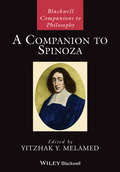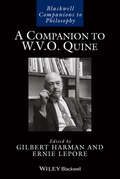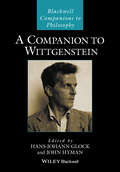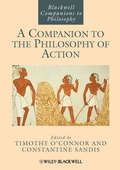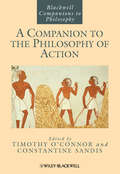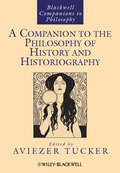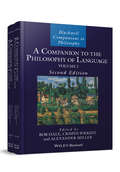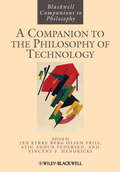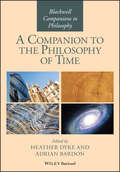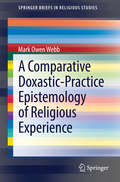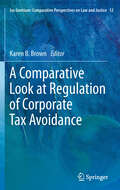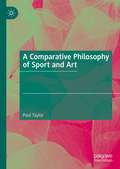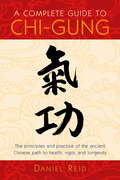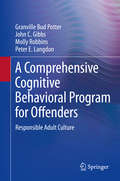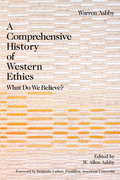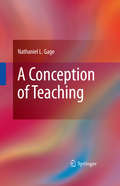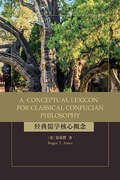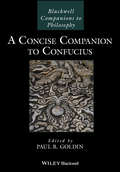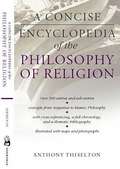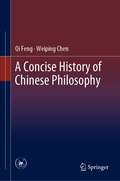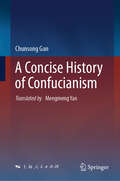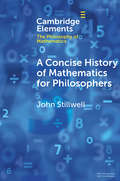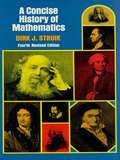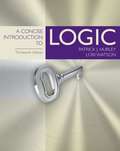- Table View
- List View
A Companion to Spinoza (Blackwell Companions to Philosophy)
by Yitzhak Y. MelamedAn unparalleled collection of original essays on Benedict de Spinoza's contributions to philosophy and his enduring legacy A Companion to Spinoza presents a panoramic view of contemporary Spinoza studies in Europe and across the Anglo-American world. Designed to stimulate fresh dialogue between the analytic and continental traditions in philosophy, this extraordinary volume brings together 53 original essays that explore Spinoza’s contributions to Western philosophy and intellectual history. A diverse team of established and emerging international scholars discuss new themes and classic topics to provide a uniquely comprehensive picture of one of the most influential metaphysicians of all time. Rather than simply summarizing the body of existing scholarship, the Companion develops new ideas, examines cutting-edge scholarship, and suggests directions for future research. The text is structured around six thematically-organized sections, exploring Spinoza’s life and background, his contributions to metaphysics and natural philosophy, his epistemology, politics, ethics, and aesthetics, the reception of Spinoza in the work of philosophers such as Kant, Schelling, Schopenhauer, and Hegel, and more. This unparalleled research collection combines a timely overview of the current state of research with deep coverage of Spinoza’s philosophy, legacy, and influence. Part of the celebrated Blackwell Companions to Philosophy series, A Companion to Spinoza is an ideal text for advanced courses in modern philosophy, intellectual history, and the history of metaphysics, and an indispensable reference for researchers and scholars in Spinoza studies.
A Companion to W. V. O. Quine (Blackwell Companions to Philosophy)
by Gilbert Harman Ernie LeporeThis Companion brings together a team of leading figures in contemporary philosophy to provide an in-depth exposition and analysis of Quine’s extensive influence across philosophy’s many subfields, highlighting the breadth of his work, and revealing his continued significance today. Provides an in-depth account and analysis of W.V.O. Quine’s contribution to American Philosophy, and his position as one of the late twentieth-century’s most influential analytic philosophers Brings together newly-commissioned essays by leading figures within contemporary philosophy Covers Quine’s work across philosophy of logic, philosophy of language, ontology and metaphysics, epistemology, and more Explores his work in relation to the origins of analytic philosophy in America, and to the history of philosophy more broadly Highlights the breadth of Quine’s work across the discipline, and demonstrates the continuing influence of his work within the philosophical community
A Companion to Wittgenstein
by Hans-Johann Glock John HymanThe most comprehensive survey of Wittgenstein’s thought yet compiled, this volume of fifty newly commissioned essays by leading interpreters of his philosophy is a keynote addition to the Blackwell series on the world’s great philosophers, covering everything from Wittgenstein’s intellectual development to the latest interpretations of his hugely influential ideas. The lucid, engaging commentary also reviews Wittgenstein’s historical legacy and his continued impact on contemporary philosophical debate.
A Companion to the Philosophy of Action
by Timothy O'Connor Constantine SandisA Companion to the Philosophy of Action offers a comprehensive overview of the issues and problems central to the philosophy of action. The first volume to survey the entire field of philosophy of action (the central issues and processes relating to human actions) Brings together specially commissioned chapters from international experts Discusses a range of ideas and doctrines, including rationality, free will and determinism, virtuous action, criminal responsibility, Attribution Theory, and rational agency in evolutionary perspective Individual chapters also cover prominent historic figures from Plato to Ricoeur Can be approached as a complete narrative, but also serves as a work of reference Offers rich insights into an area of philosophical thought that has attracted thinkers since the time of the ancient Greeks
A Companion to the Philosophy of Action (Blackwell Companions To Philosophy Ser.)
by Timothy O'Connor Constantine SandisA Companion to the Philosophy of Action offers a comprehensive overview of the issues and problems central to the philosophy of action. The first volume to survey the entire field of philosophy of action (the central issues and processes relating to human actions) Brings together specially commissioned chapters from international experts Discusses a range of ideas and doctrines, including rationality, free will and determinism, virtuous action, criminal responsibility, Attribution Theory, and rational agency in evolutionary perspective Individual chapters also cover prominent historic figures from Plato to Ricoeur Can be approached as a complete narrative, but also serves as a work of reference Offers rich insights into an area of philosophical thought that has attracted thinkers since the time of the ancient Greeks
A Companion to the Philosophy of History and Historiography (Blackwell Companions to Philosophy #107)
by Aviezer TuckerThe fifty entries in this Companion cover the main issues in the philosophies of historiography and history, including natural history and the practices of historians. Written by an international and multi-disciplinary group of experts A cutting-edge updated picture of current research in the field Part of the renowned Blackwell Companions series
A Companion to the Philosophy of Language (Blackwell Companions to Philosophy #1)
by Alexander Miller Bob Hale Crispin Wright“Providing up-to-date, in-depth coverage of the central question, and written and edited by some of the foremost practitioners in the field, this timely new edition will no doubt be a go-to reference for anyone with a serious interest in the philosophy of language.” Kathrin Glüer-Pagin, Stockholm University Now published in two volumes, the second edition of the best-selling Companion to the Philosophy of Language provides a complete survey of contemporary philosophy of language. The Companion has been greatly extended and now includes a monumental 17 new essays – with topics chosen by the editors, who curated suggestions from current contributors – and almost all of the 25 original chapters have been updated to take account of recent developments in the field. In addition to providing a synoptic view of the key issues, figures, concepts, and debates, each essay introduces new and original contributions to ongoing debates, as well as addressing a number of new areas of interest, including two-dimensional semantics, modality and epistemic modals, and semantic relationism. The extended “state-of-the-art” chapter format allows the authors, all of whom are internationally eminent scholars in the field, to incorporate original research to a far greater degree than competitor volumes. Unrivaled in scope, this volume represents the best contemporary critical thinking relating to the philosophy of language.
A Companion to the Philosophy of Technology
by Vincent F. Hendricks Jan Kyrre Olsen Stig Andur PedersenDrawing on essays from leading international and multi-disciplinary scholars, A Companion to the Philosophy of Technology is the first comprehensive and authoritative reference source to cover the key issues of technology's impact on society and our lives.Presents the first complete, authoritative reference work in the fieldOrganized thematically for use both as a full introduction to the field or an encyclopedic referenceDraws on original essays from leading interdisciplinary scholarsFeatures the most up-to-date and cutting edge research in the interdisciplinary fields of philosophy, technology, and their broader intellectual environments
A Companion to the Philosophy of Technology (Blackwell Companions to Philosophy #78)
by Vincent F. Hendricks Jan Kyrre Olsen Stig Andur PedersenDrawing on essays from leading international and multi-disciplinary scholars, A Companion to the Philosophy of Technology is the first comprehensive and authoritative reference source to cover the key issues of technology’s impact on society and our lives. Presents the first complete, authoritative reference work in the field Organized thematically for use both as a full introduction to the field or an encyclopedic reference Draws on original essays from leading interdisciplinary scholars Features the most up-to-date and cutting edge research in the interdisciplinary fields of philosophy, technology, and their broader intellectual environments
A Companion to the Philosophy of Time
by Heather Dyke Adrian BardonA Companion to the Philosophy of Time presents the broadest treatment of this subject yet; 32 specially commissioned articles - written by an international line-up of experts - provide an unparalleled reference work for students and specialists alike in this exciting field.The most comprehensive reference work on the philosophy of time currently availableThe first collection to tackle the historical development of the philosophy of time in addition to covering contemporary workProvides a tripartite approach in its organization, covering history of the philosophy of time, time as a feature of the physical world, and time as a feature of experienceIncludes contributions from both distinguished, well-established scholars and rising stars in the field
A Comparative Doxastic-Practice Epistemology of Religious Experience (SpringerBriefs in Religious Studies #2)
by Mark Owen WebbThis book takes a theoretical enterprise in Christian philosophy of religion and applies it to Buddhism, thus defending Buddhism and presenting it favorably in comparison. Chapters explore how the claims of both Christianity and Theravada Buddhism rest on people's experiences, so the question as to which claimants to religious knowledge are right rests on the evidential value of those experiences. The book examines mysticism and ways to understand what goes on in religious experiences, helping us to understand whether it is good grounds for religious belief. The author argues that religious language in both Christian and Buddhist traditions is intelligible as factual discourse, and so reports of mystical experience are true or false. The book contends that those experiences can be fruitfully thought of as perceptual in kind and that they are therefore good prima facie grounds for religious belief, in the absence of defeating conditions. The work goes on to explore Christian and Buddhist testimony and how the likelihood of self-deception, self-delusion, imaginative elaboration and the like constitutes a defeating condition. It is shown that this defeater has less scope for operation in the Buddhist case than in the Christian case, and therefore Theravada Buddhism is better grounded. This work will appeal to students and scholars of philosophy and philosophy of religion, and those interested in the study of religious experience.
A Comparative Look at Regulation of Corporate Tax Avoidance (Ius Gentium: Comparative Perspectives on Law and Justice #12)
by Karen B. BrownThis volume provides a fascinating look at the anti-tax avoidance strategies employed by more than fifteen countries in eastern and western Europe, Canada, the Pacific Rim, Asia, Africa, and the United States. It surveys the similarities and differences in anti-avoidance regimes and contains detailed chapters for each country surveying the moral and legal dimensions of the problem. The proliferation of tax avoidance schemes in recent years signals the global dimensions of a problem presenting a serious challenge to the effective administration of tax laws. Tax avoidance involves unacceptable manipulation of the law to obtain a tax advantage. These transactions support wasteful behavior in which corporations enter into elaborate, circuitous arrangements solely to minimize tax liability. It frustrates the ability of governments to collect sufficient revenue to provide essential public goods and services. Avoidance of duly enacted provisions (or manipulation to secure tax benefits unintended by the legislature) poses a threat to the effective operation of a free society for the benefit of a small group of members who seek the privilege of shifting their tax burden onto others merely to compete in the world of commerce. In a world in which world treasuries struggle for the resources to battle terrorist threats and to secure a decent standard of living for constituents tax avoidance can bring economies close to the edge of sustainability. As tax avoidance is one of the top concerns of most nations, the importance of this work cannot be overstated.
A Comparative Philosophy of Sport and Art
by Paul TaylorThis book compares two major leisure activities – watching sport and engaging with art. It explores a range of philosophical questions that arise when sport and art are placed side by side:The works of Shakespeare, Rembrandt and Mozart have continued to fill playhouses, galleries and concert halls for centuries since they were created, while our interest in even the most epic sporting contests fades after just a few years, or even a single season. What explains this difference?Sporting contests are merely games. So why do sports fans attach such great importance to whether their team wins or loses?Do sporting contests have meaning in the way works of art do?Beauty is a central value in art. Is it important in sport?What role does morality play in sport and art?What value do sport and art contribute to the world and to the meaning of people’s lives?
A Complete Guide to Chi-Gung
by Daniel ReidChi-gung, which literally means "energy work," is a system of cultivating health, vitality, and longevity that is based on the fundamental principles of Taoism and the laws of nature. Practiced by the Chinese for thousands of years, chi-gung works with the energy found in all living things to help rid the body of the imbalances that sap our strength and give rise to disease. The simple, meditative movements, breathing exercises, and massage techniques that are the basis of chi-gung can be practiced by anyone, regardless of age or physical fitness.
A Comprehensive Cognitive Behavioral Program for Offenders: Responsible Adult Culture
by John C. Gibbs Granville Bud Potter Molly Robbins Peter E. LangdonThis book presents Responsible Adult Culture (RAC), a truly comprehensive program for helping offenders to think and act responsibly. It provides the tools of the program with great clarity. In addition to exploring the needs of all offenders, the book addresses the special needs of both female and dual-diagnosis offenders. Responsible thinking means habitually seeing others and situations accurately, rather than in self-serving and egocentrically distorted ways. Because self-centered thinking is typically reinforced by negative group norms, RAC starts with the cultivation of a constructive climate ("mutual help" groups) to motivate change. Motivated group members then gain tools for responsible thinking through "equipment" (cognitive behavioral) meetings. These tools pertain to social skills, anger management, and the correction of self-centered thinking through social perspective taking (cognitive restructuring). Beyond documented reductions in distorted thinking and recidivism rates, RAC's synergy or round-the-clock interpenetration of positive groups and tools promotes a safer and more humane institutional culture.
A Comprehensive History Of Western Ethics
by Warren AshbyOur intellectual history spans more than 2,000 years, yet, surprisingly, we have had no adequate history of Western ethics. A Comprehensive History of Western Ethics fills this void by providing an engaging, thorough, and inclusive history that encompasses both classical and modern perspectives. Author Warren Ashby speaks both to students of history and ethics and to a public interested in but often perplexed by moral values in contemporary life. Ashby embraces all who are concerned with expanding human rights, finding new ways to think about moral experience, and discovering an ethical perspective appropriate for their lives. By exploring past ethical problems, we can prepare for the future's challenges.Included with the commentary on the writings of great thinkers are in-depth discussions of Greek, biblical, and Stoic ethics; Augustine, Aquinas, and medieval views; the Renaissance, the Reformation, and ethics in the age of science; as well as the Enlightenment, Romanticism, and the last Western century.
A Conception of Teaching
by Nathaniel L. GageThe literature of the behavioural and social sciences is full of theory and research on learning and memory. Teaching is comparatively a stepchild, neglected by those who have built a formidable body of theories of learning and memory. However, teaching is where learning and memory theory should pay off. "A Conception of Teaching" dedicates a chapter to each of the following important components: the need for a theory; the possibility of a theory; the evolution of a paradigm for the study of teaching; a conception of the process of teaching; a conception of the content of teaching; a conception of students' cognitive capabilities and motivations; a conception of classroom management; and the integration of these conceptions. Written in a highly accessible style, while maintaining a base in research, Dr. Nathaniel L. Gage presents "A Conception of Teaching" with clarity and well situated within current educational debates.
A Conceptual Lexicon for Classical Confucian Philosophy (SUNY series in Chinese Philosophy and Culture)
by Roger T. AmesUses a comparative hermeneutical method to explain the most important terms in the classical Confucian philosophical texts, in an effort to allow the tradition to speak on its own terms.Over the years, Roger T. Ames and his collaborators have consistently argued for a processual understanding of Chinese natural cosmology made explicit in the Book of Changes. It is this way of thinking, captured in its own interpretive context with the expression "continuities in change" (biantong) that has shaped the grammar of the Chinese language and informs the key philosophical vocabulary of Confucian philosophy. Over the past several centuries of cultural encounter, the formula established by the early missionaries for the translation of classical Chinese texts into Western languages has resulted in a Christian conversion of Confucian texts that is still very much with us today. And more recently, the invention of a new Chinese language to synchronize East Asian cultures with Western modernity has become another obstacle in our reading of the Confucian canons. This volume, a companion volume to A Sourcebook in Classical Confucian Philosophy, employs a comparative hermeneutical method in an attempt to explain the Confucian terms of art and to take the Confucian tradition on its own terms.
A Concise Companion to Confucius
by Paul R. GoldinThis authoritative collection surveys the teachings of Confucius, and illustrates his importance throughout Chinese history in one focused and incisive volume. A Concise Companion to Confucius offers a succinct introduction to one of East Asia’s most widely-revered historical figures, providing essential coverage of his legacy at a manageable length. The volume embraces Confucius as philosopher, teacher, politician, and sage, and curates a collection of key perspectives on his life and teachings from a team of distinguished scholars in philosophy, history, religious studies, and the history of art. Taken together, chapters encourage specialists to read across disciplinary boundaries, provide nuanced paths of introduction for students, and engage interested readers who want to expand their understanding of the great Chinese master. Divided into four distinct sections, the Concise Companion depicts a coherent figure of Confucius by examining his diverse representations from antiquity through to the modern world. Readers are guided through the intellectual and cultural influences that helped shape the development of Confucian philosophy and its reception among late imperial literati in medieval China. Later essays consider Confucius’s engagement with topics such as warfare, women, and Western philosophy, which remain fruitful avenues of philosophical inquiry today. The collection concludes by exploring the significance of Confucian thought in East Asia’s contemporary landscape and the major intellectual movements which are reviving and rethinking his work for the twenty-first century. An indispensable resource, A Concise Companion to Confucius blazes an authoritative trail through centuries of scholarship to offer exceptional insight into one of history’s earliest and most influential ancient philosophers. A Concise Companion to Confucius: Provides readers with a broad range of perspectives on the ancient philosopher Traces the significance of Confucius throughout Chinese history—past, present, and future Offers a unique, interdisciplinary overview of Confucianism Curated by a team of distinguished scholars in philosophy, history, religious studies, and the history of art A Concise Companion to Confucius is an ideal text for undergraduate and graduate courses on Confucius and Confucianism. It is also fascinating and informative reading for anyone interested in learning more about one of history’s most influential philosophers.
A Concise Encyclopedia of the Philosophy of Religion (Concise Encyclopedias)
by Anthony C. ThiseltonCovering thinkers from Plato to Freud, offering detailed explanations of key themes such as evil, and outlining clear definitions of complex ideas like'the doctrine of analogy,' this is a comprehensive reference tool for all those studying, or interested in, the philosophy of religion
A Concise History of Chinese Philosophy
by Qi Feng Weiping ChenThis book is an abridged version of Feng Qi’s two major works on the history of philosophy, The Logical Development of Ancient Chinese Philosophy and The Revolutionary Course of Modern Chinese Philosophy. It is a comprehensive history of Chinese philosophy taking the reader from ancient times to the year 1949. It illuminates the characteristics of traditional Chinese philosophy from the broader vantage point of epistemology. The book revolves around important debates including those on “Heaven and humankind” (tian ren天人), “names and actualities” (mingshi名實), “principle and vital force” (liqi理氣), “the Way and visible things” (daoqi道器), “mind and matter/things” (xinwu心物), and “knowledge and action” (zhixing知行). Through discussion of these debates, the course of Chinese philosophy unfolds. Modern Chinese philosophy has made landmark achievements in the development of historical and epistemological theory, namely the “dynamic and revolutionary theory of reflection”. However, modern Chinese philosophy is yet to construct a systematic overview of logic and methodology, as well as questions of human freedom and ideals. Amid this discussion, the question of how contemporary China is to “take the baton” from the thinkers of the modern philosophical revolution is addressed.
A Concise History of Confucianism
by Chunsong GanThis book is a readable and insightful analytical work that steadily traces and analyzes the historical development of Confucianism in China. This book is structured chronologically and discusses the developing positions of Confucianism across different periods in the Chinese history. Each chapter focuses on a number of key questions and perspectives pertaining to Confucian thoughts and ideas, for example, &‘Benevolence&’ and &‘Propriety&’ in Pre-Qin Confucianism, studies of Mencius and Xunzi, and Dong Zhongshu of the Han Dynasty . In addition, this book pays special and extensive attention to ideas of New Confucianism, its concepts, and formation. This book is written in a simple yet comprehensible style. It aims to broaden and deepen studies of Confucianism via its stage-by-stage discussion about the historical development of Confucian thoughts. Both academic specialists and ordinary readers will find the book helpful and inspiring in its clear and vivid delineation, analysis, and debate about the essence, function, and role of Confucianism in traditional and modern societies alike.
A Concise History of Mathematics for Philosophers (Elements in the Philosophy of Mathematics)
by John StillwellThis Element aims to present an outline of mathematics and its history, with particular emphasis on events that shook up its philosophy. It ranges from the discovery of irrational numbers in ancient Greece to the nineteenth- and twentieth-century discoveries on the nature of infinity and proof. Recurring themes are intuition and logic, meaning and existence, and the discrete and the continuous. These themes have evolved under the influence of new mathematical discoveries and the story of their evolution is, to a large extent, the story of philosophy of mathematics.
A Concise History of Mathematics: Fourth Revised Edition (Dover Books on Mathematics)
by Dirk J. StruikThis compact, well-written history -- first published in 1948, and now in its fourth revised edition -- describes the main trends in the development of all fields of mathematics from the first available records to the middle of the 20th century. Students, researchers, historians, specialists -- in short, everyone with an interest in mathematics -- will find it engrossing and stimulating.Beginning with the ancient Near East, the author traces the ideas and techniques developed in Egypt, Babylonia, China, and Arabia, looking into such manuscripts as the Egyptian Papyrus Rhind, the Ten Classics of China, and the Siddhantas of India. He considers Greek and Roman developments from their beginnings in Ionian rationalism to the fall of Constantinople; covers medieval European ideas and Renaissance trends; analyzes 17th- and 18th-century contributions; and offers an illuminating exposition of 19th century concepts. Every important figure in mathematical history is dealt with -- Euclid, Archimedes, Diophantus, Omar Khayyam, Boethius, Fermat, Pascal, Newton, Leibniz, Fourier, Gauss, Riemann, Cantor, and many others. For this latest edition, Dr. Struik has both revised and updated the existing text, and also added a new chapter on the mathematics of the first half of the 20th century. Concise coverage is given to set theory, the influence of relativity and quantum theory, tensor calculus, the Lebesgue integral, the calculus of variations, and other important ideas and concepts. The book concludes with the beginnings of the computer era and the seminal work of von Neumann, Turing, Wiener, and others."The author's ability as a first-class historian as well as an able mathematician has enabled him to produce a work which is unquestionably one of the best." -- Nature Magazine.
A Concise Introduction To Logic
by Patrick J. Hurley Lori WatsonTens of thousands of students have learned to be more discerning at constructing and evaluating arguments with the help of Patrick J. Hurley. Hurley’s lucid, friendly, yet thorough presentation has made A CONCISE INTRODUCTION TO LOGIC the most widely used logic text in North America. In addition, the book’s accompanying technological resources, such as CengageNOW and Learning Logic, include interactive exercises as well as video and audio clips to reinforce what you read in the book and hear in class. In short, you’ll have all the assistance you need to become a more logical thinker and communicator.
